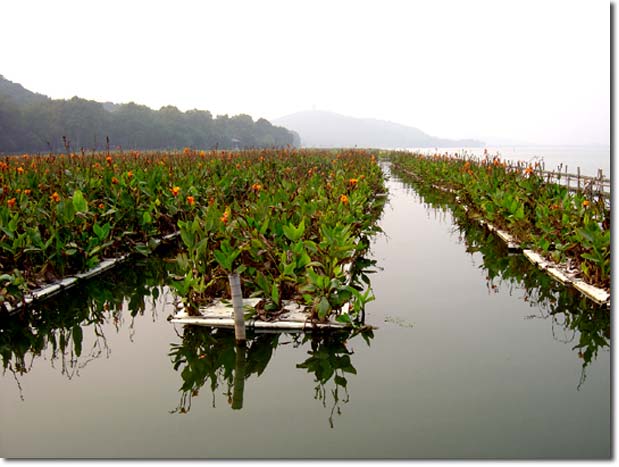 Lake Taihu algal bloom (Credit: LIU JIN/AFP/Getty Images)
Lake Taihu algal bloom (Credit: LIU JIN/AFP/Getty Images)
Lake Taihu experienced its worst ever algal bloom at the height of
summer, pushing researchers to search for new solutions. They decided to
try a new technology, Aqua Biofilter, that is designed to remove
nutrients that fuel algal blooms. An ambitious aspect of the project was
to launch the world’s largest aquaponics system, over 4 acres in size,
using new technologies in combination with old world bamboo that is used
in traditional Chinese building. Experiments growing rice on fish ponds
provided a foundation for scaling up to lakes and larger water bodies
for earth and water repair.
 Growing rice aquaponics on fish ponds in China (Credit: Dr Kangmin Lee)
Growing rice aquaponics on fish ponds in China (Credit: Dr Kangmin Lee)
The technology is part of the new wave of products that biomimics
nature, using biomaterials that can remediate and restore nature’s
balance with non-toxic and sustainable processes. The concept was
adapted from natural wetlands that process nutrients and pollutants with
plants. Mature wetland ecosystems often develop self-sustaining
floating wetlands that mop up pollutants. Most lakes and urban wetlands
are highly modified or recently built, with polluted inflows, making it
necessary for human intervention, taking the best of what nature has
developed naturally to tackle pollutants that run-off from urban and
industrial areas.
 Aqua Biofilter project, Lake Taihu (Credit Tom Duncan)
Aqua Biofilter project, Lake Taihu (Credit Tom Duncan)

Algal bloom removal shown in water
samples, Lake Taihu
(Credit Dr Kangmin Lee) |
Lake Taihu has extensive aquaculture industry that suffered mass die
offs and threatened the future of the industry. The research team chose
plant species that would beautify the lake, and also provide rapid root
growth which serve as habitat for native fish to spawn and provide
refuge from the toxic algal bloom.
Three months after project implementation, the water cleared
completely with no visible algae and water transparency improved by
250%. The plants had soaked up the excess nutrients, cutting off the
nutrient supply that algal blooms require to grow. Roots exert a strong
biofilm that captures nutrients and pollutants, and de-nitrifies the
water allowing natural balance to be restored.
 Aqua Biofilter project, Lake Taihu (Credit Tom Duncan)
Aqua Biofilter project, Lake Taihu (Credit Tom Duncan)
Some 200 square foot of Aqua Biofilter provides a root biofilm
surface area of 1 acre, delivering incredible rates of nutrient and
pollutant removal, at zero cost once installed. The lack of operational
expenses makes the technology attractive to local governments and water
managers who need quick results at an affordable price. The benefits of
floating wetlands go beyond improving water quality, by also serving as
habitat for diverse water fauna, enabling complete restoration of
aquatic ecosystems.
 Aqua Biofilter project, Lake Taihu, China (Credit Tom Duncan)
Aqua Biofilter project, Lake Taihu, China (Credit Tom Duncan)
Company CEO Tom Duncan has done some interesting Aqua Biofilter
projects including growing rice on floating reedbeds, and writing
Chinese characters with plants in urban developments on waterways in
Nanjing to promote water conservation for urban apartment dwellers and
skyscrapers viewing the waterways below.
 Aqua Biofilter project, Nanjing (Credit Tom Duncan)
Aqua Biofilter project, Nanjing (Credit Tom Duncan)







No comments:
Post a Comment